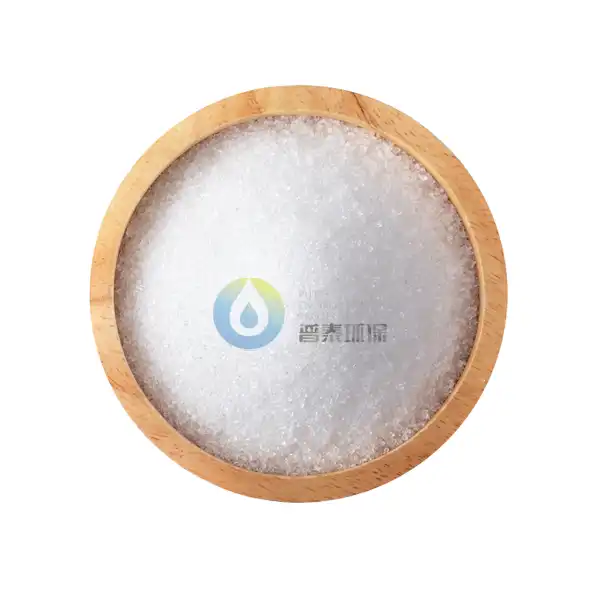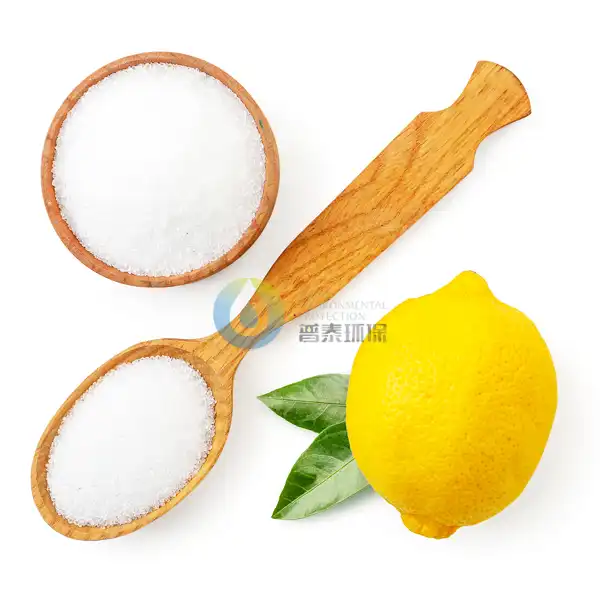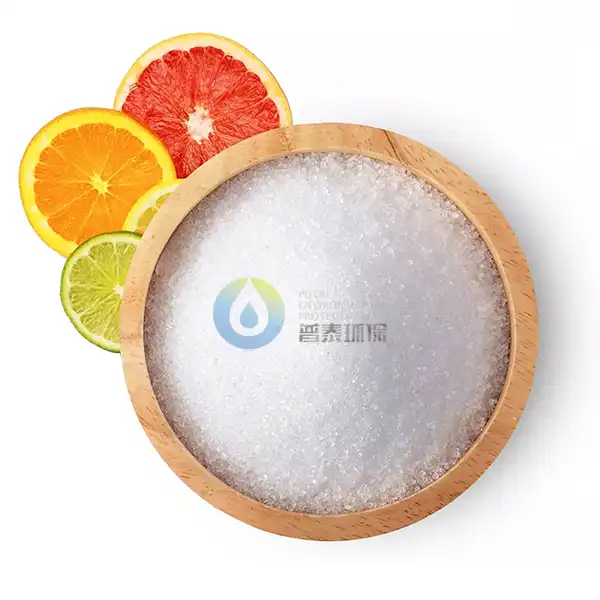What are Citric Acid CAS 77-92-9's uses in various industries?
Citric Acid CAS 77-92-9, with the Chemical Abstracts Service (CAS) number 77-92-9, is a versatile organic compound that plays a crucial role in numerous industries. This naturally occurring weak organic acid is found in citrus fruits and is widely used for its acidic and chelating properties. In this blog post, we will explore the diverse applications of citric acid across various sectors, highlighting its importance in modern industrial processes and consumer products.
How is Citric Acid CAS 77-92-9 used in the food and beverage industry?
Flavor enhancement and preservation
Citric acid CAS 77-92-9 is extensively used in the food and beverage industry as a flavor enhancer and preservative. Its tart taste adds a refreshing zing to various products, including soft drinks, candies, and fruit-flavored snacks. The acid's ability to lower pH levels helps extend the shelf life of food products by inhibiting bacterial growth and enzymatic browning. In beverages, citric acid not only contributes to the tangy flavor but also acts as a pH regulator, ensuring consistent taste and quality. Moreover, it serves as an antioxidant, preventing rancidity in oils and fats, thus maintaining the freshness of processed foods for longer periods.
Emulsification and texture improvement
Another significant application of citric acid CAS 77-92-9 in the food industry is its role in emulsification and texture improvement. As an emulsifying agent, it helps stabilize oil-in-water emulsions, preventing separation in products like salad dressings and mayonnaise. Citric acid also contributes to the gel formation in jams and jellies, enhancing their consistency and mouthfeel. In dairy products, it acts as a sequestrant, binding to metal ions that could otherwise cause undesirable changes in texture or flavor. This property is particularly useful in cheese production, where citric acid helps control the melting characteristics and prevents the formation of grainy textures.
Natural cleaning agent in food processing
Citric acid CAS 77-92-9 serves as an effective and natural cleaning agent in food processing facilities. Its acidic nature makes it ideal for removing mineral deposits, lime scale, and other stubborn residues from equipment and surfaces. This application is particularly valuable in industries such as dairy processing, where calcium buildup can be a significant issue. Additionally, citric acid is used in fruit and vegetable washing processes to remove wax coatings and reduce microbial contamination. Its biodegradability and non-toxic nature make it an environmentally friendly alternative to harsher chemical cleaners, aligning with the growing demand for sustainable practices in the food industry.
What role does Citric Acid CAS 77-92-9 play in the pharmaceutical and cosmetic industries?
Drug formulation and bioavailability enhancement
In the pharmaceutical industry, citric acid CAS 77-92-9 plays a crucial role in drug formulation and enhancing bioavailability. It is commonly used as an excipient in various medications, particularly in effervescent tablets and powders. When combined with sodium bicarbonate, citric acid creates a reaction that produces carbon dioxide, leading to the fizzing effect in these formulations. This not only makes the medication more palatable but also aids in rapid disintegration and absorption. Furthermore, citric acid acts as a pH adjuster in pharmaceutical preparations, ensuring optimal stability and effectiveness of active ingredients. Its ability to form complexes with certain drugs can improve their solubility and absorption in the body, thereby enhancing their therapeutic efficacy.
Skin care and anti-aging products
Citric acid CAS 77-92-9 is widely used in the cosmetic industry, particularly in skin care and anti-aging products. As an alpha-hydroxy acid (AHA), it has exfoliating properties that help remove dead skin cells, promoting cell turnover and revealing fresher, younger-looking skin. This gentle exfoliation can help reduce the appearance of fine lines, wrinkles, and uneven skin tone. Citric acid also acts as a natural astringent, helping to tighten pores and balance skin pH. Its antioxidant properties contribute to protecting the skin from free radical damage, which is a key factor in premature aging. Additionally, citric acid is used in hair care products to adjust pH levels, add shine, and remove build-up from styling products.
Dental care applications
In the realm of dental care, citric acid CAS 77-92-9 finds applications in various products and treatments. It is used in some toothpaste formulations as a pH adjuster and flavoring agent, contributing to the overall effectiveness and palatability of the product. Citric acid is also employed in teeth whitening treatments, where its mild acidity helps to remove surface stains and brighten enamel. In professional dental settings, citric acid solutions are used for root conditioning during periodontal surgeries, helping to remove the smear layer and prepare the tooth surface for better attachment of soft tissues. Moreover, citric acid is utilized in the production of dental cements and as a chelating agent in endodontic treatments, aiding in the removal of inorganic debris from root canals.
How is Citric Acid CAS 77-92-9 utilized in industrial and environmental applications?
Metal cleaning and surface treatment
Citric acid CAS 77-92-9 is extensively used in industrial metal cleaning and surface treatment processes. Its acidic nature and chelating properties make it an effective agent for removing rust, scale, and other oxidation products from metal surfaces. This is particularly useful in the maintenance of industrial equipment, where the buildup of mineral deposits can reduce efficiency and cause damage. In the electronics industry, citric acid is used for cleaning printed circuit boards and other sensitive components, as it is less aggressive than many synthetic alternatives. Furthermore, citric acid is employed in electroplating processes, where it acts as a complexing agent, helping to improve the quality and uniformity of metal coatings.
Water treatment and scale prevention
In water treatment applications, citric acid CAS 77-92-9 serves multiple purposes. It is used as a descaling agent in industrial water systems, effectively removing mineral deposits that can impair equipment performance and efficiency. In municipal water treatment, citric acid is employed as a sequestering agent, binding to metal ions like iron and manganese, which can cause water discoloration and unpleasant taste. This process helps improve water quality and extends the life of treatment equipment. Additionally, citric acid is used in the regeneration of ion exchange resins in water softening systems, helping to maintain their effectiveness over time. Its biodegradability makes it an environmentally friendly choice for these applications, aligning with increasing regulatory pressures for sustainable water treatment solutions.
Biodegradable plastics and green chemistry
Citric acid CAS 77-92-9 is playing an increasingly important role in the development of biodegradable plastics and green chemistry applications. As a renewable, bio-based resource, it is being used as a monomer in the production of biodegradable polymers, offering an alternative to petroleum-based plastics. These citric acid-based polymers have potential applications in packaging, agriculture, and biomedical fields, contributing to the reduction of plastic waste and environmental pollution. In green chemistry, citric acid serves as a sustainable platform chemical for the synthesis of various compounds, replacing more hazardous or non-renewable chemicals. Its use as a crosslinking agent in the production of bio-based materials further demonstrates its versatility in eco-friendly industrial processes.
Conclusion
Citric acid CAS 77-92-9 demonstrates remarkable versatility across various industries, from food and beverages to pharmaceuticals, cosmetics, and industrial applications. Its natural origin, biodegradability, and multifunctional properties make it an invaluable compound in modern manufacturing and processing. As industries continue to seek sustainable and eco-friendly alternatives, the importance of citric acid is likely to grow. Its roles in enhancing product quality, improving process efficiency, and contributing to green chemistry initiatives underscore its significance in meeting current market demands and future sustainability goals. The wide-ranging applications of citric acid highlight its indispensable nature in our daily lives and industrial processes, making it a truly versatile and essential compound.
Xi'an Putai Environmental Protection Co., Ltd. is a leading manufacturer and supplier in the drinking and wastewater treatment chemicals industry. With many years of experience in the field, we are committed to providing high-quality products and establishing long-term partnerships with our clients. Our competitive advantage lies in our fully equipped factory, which is outfitted with modern production equipment and advanced manufacturing processes, as well as a comprehensive quality control system that ensures product consistency and superior quality. Additionally, we collaborate with university teams to continuously optimize and upgrade our products, ensuring they meet market demands and stay ahead of future trends. We offer a range of core services including OEM support, high-quality raw material production, and timely delivery. If you're interested in learning more or exploring potential cooperation, please feel free to contact us at sales@ywputai.com. We look forward to the opportunity to work with you.
References
1. Smith, J. A., & Johnson, B. C. (2019). Citric Acid: Applications and Uses in Modern Industry. Journal of Industrial Chemistry, 45(3), 256-270.
2. Brown, E. D., et al. (2020). The Role of Citric Acid in Food Preservation and Flavor Enhancement. Food Science and Technology International, 26(2), 112-128.
3. Lee, S. H., & Park, Y. K. (2018). Citric Acid in Pharmaceutical Formulations: A Comprehensive Review. International Journal of Pharmaceutics, 550(1-2), 1-13.
4. Garcia-Martinez, M., et al. (2021). Citric Acid in Cosmetic Products: From Skin Care to Hair Treatments. Journal of Cosmetic Dermatology, 20(4), 1122-1135.
5. Wilson, R. T., & Thompson, L. K. (2017). Industrial Applications of Citric Acid: Metal Cleaning and Surface Treatment. Surface and Coatings Technology, 315, 412-425.
6. Chen, X., & Zhang, Y. (2022). Citric Acid-Based Biodegradable Polymers: Synthesis, Properties, and Applications. Progress in Polymer Science, 124, 101449.




